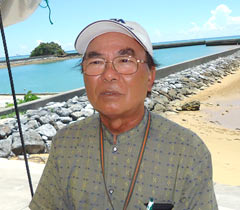Former Fishery Cooperative President: “Don’t reclaim Henoko”

On August 27, at Henoko in Nago, Jinsho Nishime visited Henoko and said, "If we reclaim Oura Bay, the fishing grounds on the entire east coast will be affected," expressing his opposition to the reclamation.
August 28, 2014 Yugo Okita of Ryukyu Shimpo
“Henoko and Oura Bay are the only remaining rich fishing grounds on the east coast of Okinawa. If we just sit by and watch the reclamation, the fishing industry of Okinawa will not survive long.” The self-proclaimed “Chief of the Fish Market”, former Okinawa Prefecture Fishery Cooperative president Jinsho Nishime, voiced his opposition to the land reclamation in Henoko being carried out for the relocation of Futenma Air Station.
Nishime was not originally a fisherman, but he played a part in founding the Iheya Village Fishery Cooperative. Nishime became its first president at the age of 32, and has been involved in managing the cooperative ever since. “No one can live an abundant life with just subsidies that are unearned income. Self-reliance for fisherman is connected to such abundance.” That was his philosophy when he managed and cultivated mozuku, helping it become Iheya’s representative local product.
From 2002 to 2008, he was the president of the Okinawa Prefectural Fishery Credit Cooperative, and between 2003 and 2006 he was simultaneously the president of the Okinawa Prefecture Fishery Cooperative . As president of the prefectural fishery cooperative, he faced problems related to adverse effects of the U.S. military on the fishing industry. These were red soil runoff from the construction of an urban training facility in Camp Hansen in Kin and the crashing of an American F-15 fighter jet in training airspace in the northeast of Ikei Island in Uruma. He said, “Okinawa’s seas, skies, and land are being used by the U.S. military as if it were their own, and the Japanese government accepts that. Regardless of ideology or beliefs, anyone who puts some thought into this will find this situation ridiculous.”
He made multiple visits to the then-Naha Defense Facility Bureau and the Okinawa office of the Ministry of Foreign Affairs protesting the accidents and requesting a suspension of training activities. However, the situation did not change. He said he realized that, “The training the U.S. military carries out is in preparation for war, which is not in the interests of the civilians who want to live in peace. These two cannot coexist.”
In the spring of 2005, he visited Teima Fishing Harbor in Nago to listen to the people directly. After listening to the fishermen who swelled with pride as they recalled bringing up their children on the bounty of Oura Bay, his conviction the sea must not be lost became stronger.
He believes there are present fishermen who are against them building of the military base. “Because of their obligations, there are many people who cannot voice their opinions. However, staying silent will bring about resentment in future. Speaking out is essential so we do not leave our children and grandchildren with a negative legacy,” he said, hoping the fishermen will voice their protests too.
(English translation by T&CT and Lima Tokumori)
Previous Article:Tornado appears over Oura Bay in Nago
Next Article:Himeyuri Peace Museum welcomes its 20 millionth visitor on 25th year anniversary
[Similar Articles]
- Mozuku harvest begins in Miyakojima, yielding “thick, high quality seaweed, a prime result”
- Fishing village exterminates 145 sharks in effort to prevent damage to fishing hauls July 18, 2020 Ryukyu Shimpo
- Repaired fishing vessels donated to areas stricken by the Great East Japan Earthquake
- A super-sized haul of high-class spangled emperor fish known as taman brought into Toya Fishing Port in Yomitan, “It will be tasty any way you cook it”
- Okinawan and Taiwanese fishermen agree on operation in waters north of Yaeyama
 Webcam(Kokusai Street)
Webcam(Kokusai Street)


